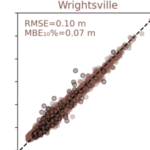 Storm-driven flooding is a hazard for coastal communities. Process-based models can predict the combined effects of tides, winds, and flooding due to tropical cyclones, including in real-time, but often with restrictions due to a model’s runtime. Researchers have developed neural networks (NN), trained on libraries of storm surge simulations, to predict flooding in seconds. However, previous NNs ignored interactions with astronomical tides, limited to storms of specific durations, and trained for extreme conditions.
Storm-driven flooding is a hazard for coastal communities. Process-based models can predict the combined effects of tides, winds, and flooding due to tropical cyclones, including in real-time, but often with restrictions due to a model’s runtime. Researchers have developed neural networks (NN), trained on libraries of storm surge simulations, to predict flooding in seconds. However, previous NNs ignored interactions with astronomical tides, limited to storms of specific durations, and trained for extreme conditions.
In this study, a NN is developed to predict peak values for storm tides (storm surge and tides) at nine stations along the North Carolina coast. For training, a library of storm-tides was developed via process-based model simulations of 1,813 synthetic storms based on historical data in the north Atlantic Ocean, but with a specific focus on North Carolina, and then augmented by a factor of 50 via combinations with random tides. Unlike previous NN, this approach incorporates the astronomical tides in the training and uses data augmentation techniques for enhanced generalization. The NN performs well, with root-mean-square errors of about 6 cm and mean bias errors for the extreme storms of about 5 cm. For probabilistic predictions of historical storms, the model can predict for 100 ensemble members in 1 sec, and the ranges of peak storm tides are close to their true values.


 Undergraduate student Brandon Tucker won an Outstanding Senior Award for Scholarly Achievement, which recognizes exceptional academic performance including participation in undergraduate research. Brandon was among four outstanding seniors
Undergraduate student Brandon Tucker won an Outstanding Senior Award for Scholarly Achievement, which recognizes exceptional academic performance including participation in undergraduate research. Brandon was among four outstanding seniors